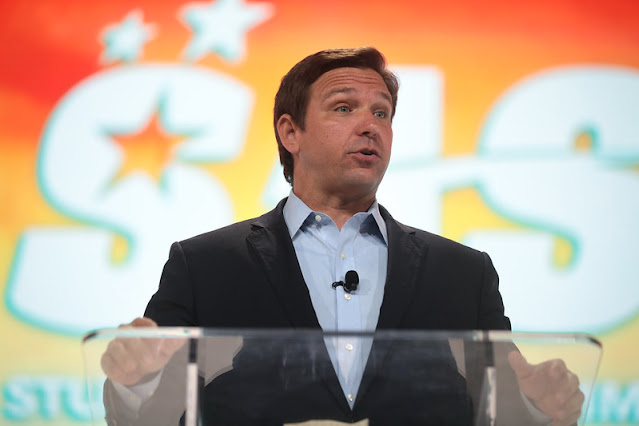 |
| Photo credit: Gage Skidmore/CC BY-SA 2.0, via Flickr |
DeSantis Challenges Biden's Potential Recognition of Palestinian State: Navigating the Complex Landscape of Middle East Politics
Introduction:
In a recent press briefing, Governor Ron DeSantis of Florida vehemently criticized reports suggesting that President Biden may unilaterally recognize a Palestinian state. The governor's remarks underscore the deeply rooted complexities of the Israeli-Palestinian conflict and highlight concerns about the potential consequences of such a diplomatic move.
Unpacking DeSantis' Comments:
DeSantis began by expressing disbelief at the idea of unilaterally recognizing a Palestinian Arab State, asking, "What planet are we living on?" His strong language reflects the gravity of the situation and the emotional responses that discussions surrounding the Middle East often evoke.
The governor drew attention to the unique position of Israel, being the only country on Earth regularly subjected to attacks and wars. He questioned the logic of expecting Israel to concede territory given its history of conflict, emphasizing that the nation has faced security threats since the late 1940s.
Historical Context:
DeSantis pointed to the historical context, citing the continuous struggle in the region. He highlighted an attack on October 7th, underscoring the existential threat faced by Israel. According to DeSantis, the intentions of groups like Hamas go beyond territorial disputes; they aim for a second Holocaust and the destruction of Israel. This perspective forms the basis of DeSantis' argument against any actions that might jeopardize Israel's security.
Ignorance of History:
The governor criticized what he perceives as an ignorance of history, asserting that those advocating for actions against Israel fail to recognize the deep historical ties between the land and the Jewish people. He argued that a lack of understanding of the region's history undermines the credibility of any proposed diplomatic solutions.
Florida's Stance and DeSantis' Leadership:
DeSantis proudly declared Florida as the most pro-Israel state in the United States. He reiterated his commitment to this stance and emphasized that his administration has fulfilled the promise made during his gubernatorial campaign. The governor's unwavering support for Israel is a crucial aspect of his political identity, and he showcased it as a point of pride.
Conclusion:
Governor DeSantis' strong condemnation of potential recognition of a Palestinian state by the Biden administration reveals the intricate web of historical, geopolitical, and security considerations embedded in the Israeli-Palestinian conflict. As diplomatic discussions unfold, the governor's remarks offer a glimpse into the challenges faced by policymakers navigating this complex landscape. The potential recognition of a Palestinian state emerges as a contentious issue with broader implications for regional stability and global diplomacy.
'What Planet Are We Living On?': Governor DeSantis Blasts Reports President Biden May Recognize Palestinian State
Comments
Post a Comment
Please do not enter any spam link in the comment box.